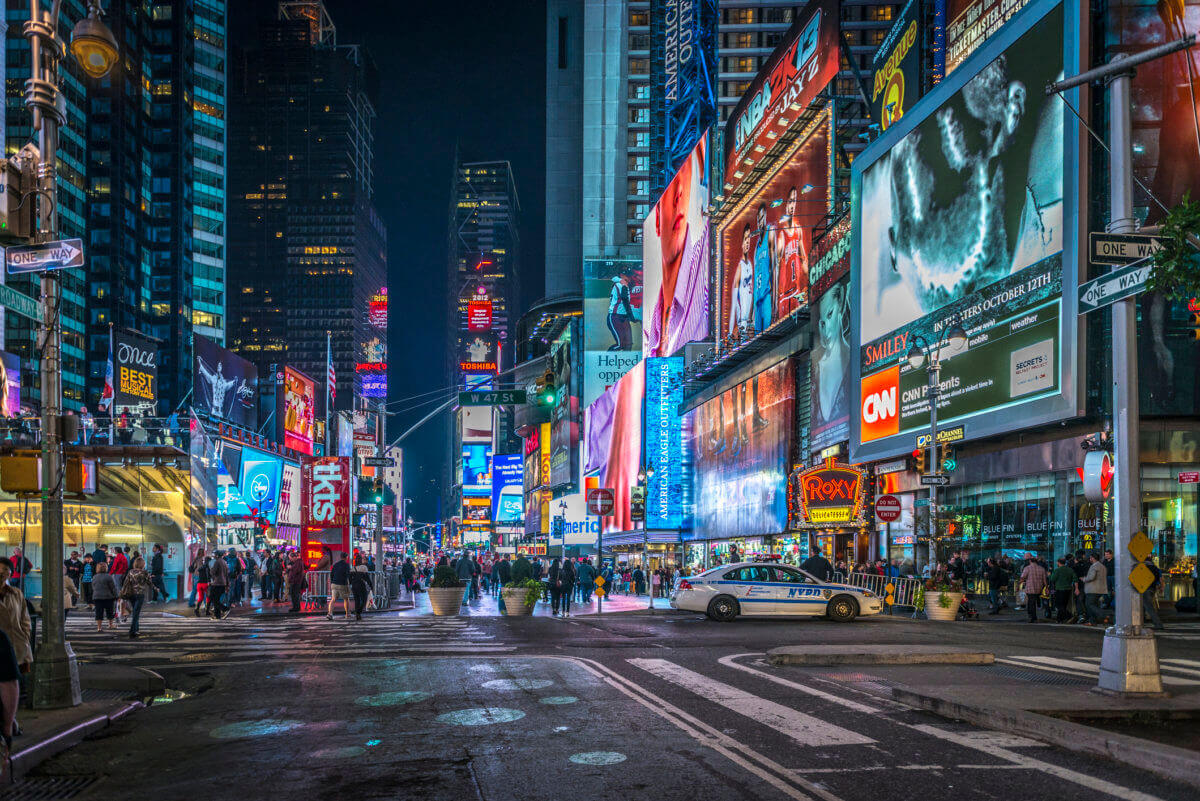This story was reported by Timothy Bolger, Ben Brachfeld, Jada Camille, Aidan Graham, Carlotta Mohamed, Dean Moses, Bill Parry, Aliya Schneider, Robbie Sequeira and Ethan Stark-Miller. It was edited by Christian Murray and Robert Pozarycki.
New Yorkers are bearing witness to a World Series of Poker-style showdown featuring ten bids involving some of the biggest names in real estate and gaming for three highly-coveted full casino licenses.
The high rollers are bidding for three licenses permitting Las Vegas-style gambling with table games; the permits were authorized last year for downstate New York, covering the five boroughs, Long Island and Westchester County.
The authorization came nearly 10 years after voters approved the legalization of casinos in a state referendum, which opened the door for seven casinos in New York state. Four licenses have already been awarded to upstate operators.
There are at least 10 bids in the mix for a license in downstate New York, with proposals that range from a Monte Carlo-type casino to a mega development that would include a Ferris wheel and museum.
State gambling regulators, who are overseeing the process, have said that the licenses are likely to be awarded “later in 2023 at the earliest.”
Four of the proposals announced so far are in Manhattan, two in Queens, one in Brooklyn and another in the Bronx. Two additional proposals have come in from the suburbs, with one from Westchester and another from Long Island.
Placing big bets on the board
Like an exclusive, high-stakes game of Texas Hold’em, the process has been reserved for the uber-wealthy — with an applicant needing more than $1 billion just to be in the running. The ante to merely apply is $1 million, with successful bidders required to pay $500 million upfront for the license and at least $500 million as part of a development plan. Licenses will be good for a minimum of 10 years and a maximum of 30 years.
The winners will be selected by a three-person state Gaming Facility Location Board, which will then make recommendations to the state’s Gaming Commission.
The developers, however, must first win the support of the local community where their plan is proposed.
Each project is to be reviewed by a local group — known as a Community Advisory Committee — which must sign off on it. Each committee consists of six people, with the governor, mayor, the local state senator, local state assembly member, the borough president and the local city council member each appointing a representative.
Their role is to gauge the interest of the community and make a recommendation. At least four of the six committee members must approve of the plan for it to move forward.
The applicants must also meet all environmental and zoning requirements before their plans are reviewed by the Gaming Facility Location Board.
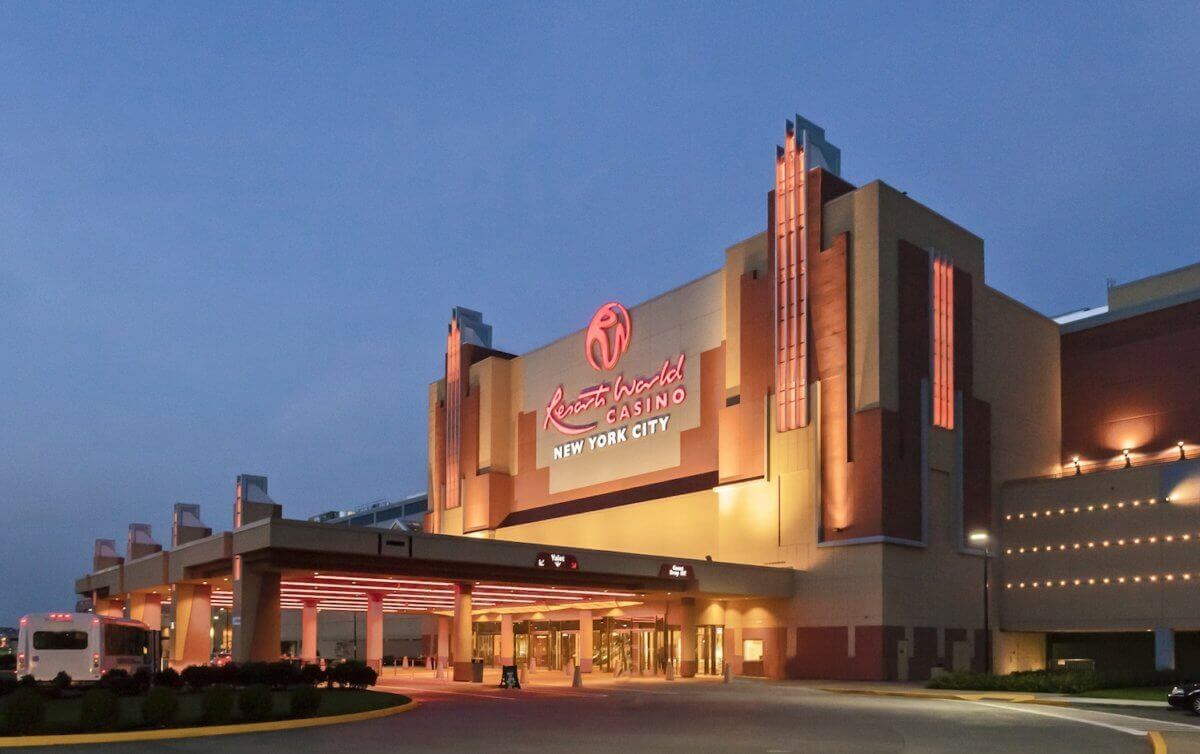
Two of the 10 proposals have come from racinos—companies that operate racetracks with video slots machines. Both racinos, industry insiders say, are favorites to be awarded full gaming licenses.
One is Resorts World New York City in Queens, at Aqueduct Racetrack, and the other is MGM’s Empire City Casino at Yonkers Raceway.
Both racinos are likely to have little community resistance, pundits say, and would be able to convert to a full casino relatively quickly. Furthermore, they have the infrastructure needed for expansion, with parking and access to highways.
Resorts World, which opened in 2011 and has 6,500 slots and electronic table games, would be able to build out the facility to include live dealers at table games with relative ease. They have at least one ally in a local legislator.
“Certainly, they’ve had 11 very successful years of being a part of the southeast Queens community where they are a really good neighbor — and the biggest factor is they have the infrastructure in place and they’re ready to expand,” said state Senator Joseph Addabbo (D-Queens), who chairs the state Senate Committee on Racing, Gaming and Wagering.
“I do think they have a number of advantages beginning with location, and their proximity to the airport and accessibility to the city, I think that bodes well for them.”
The Empire City Casino, which is 15 miles from Times Square, has similar attributes as Resorts World and operates thousands of slot machines. The license would merely be an expansion, and not a project that has to be built from the ground up.
“I hear from industry sources hypothetically that MGM and Resorts World would get the licenses and that would leave the one to go somewhere else,” Addabbo said.
The eight other proposals are large and varied and are located throughout the region.
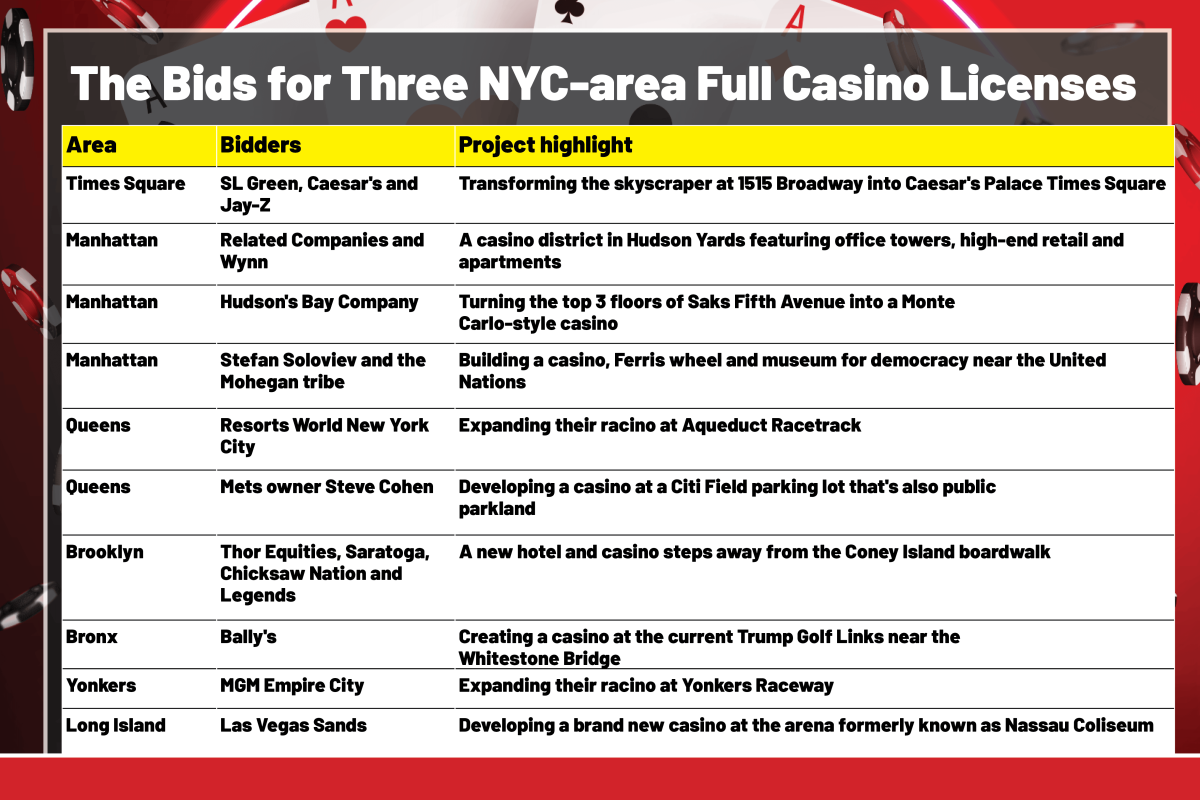
Monte Carlo in Manhattan?
The Manhattan proposals are filled with glitz and glamor.
The Times Square plan involves redeveloping 1515 Broadway, an office skyscraper in the heart of Times Square by West 44th Street that has an existing Broadway theater located on the ground floor. The casino would be housed in the building that would also include a hotel and restaurants.
The proposal has been put together by SL Green Realty, Caesars Entertainment and Jay-Z. The casino would be known as Caesars Palace Times Square.
“We believe that Times Square offers the best location for a new resort casino that can attract tourists and benefit local businesses,” said Marc Holliday, CEO of SL Green Realty, which is Manhattan’s largest landlord of office space. “A casino in Times Square is in keeping with existing uses in the area. Times Square is the center of the entertainment universe.”
SL Green, according to reports, has also pledged to use a portion of the casino’s revenues to fund safety and sanitation improvements in Times Square.
The Saks Fifth Avenue proposal also calls for transforming an existing building.
The plan, put forward by Hudson’s Bay Company, the owner of Saks Fifth Avenue, involves converting the top three floors of the Midtown store into a high-end casino.
The company’s aim is to create a Monte Carlo-style casino that would attract wealthy tourists from across the globe.
The project, which was first reported by the New York Times, would not require any major development and could be up and running within a year.
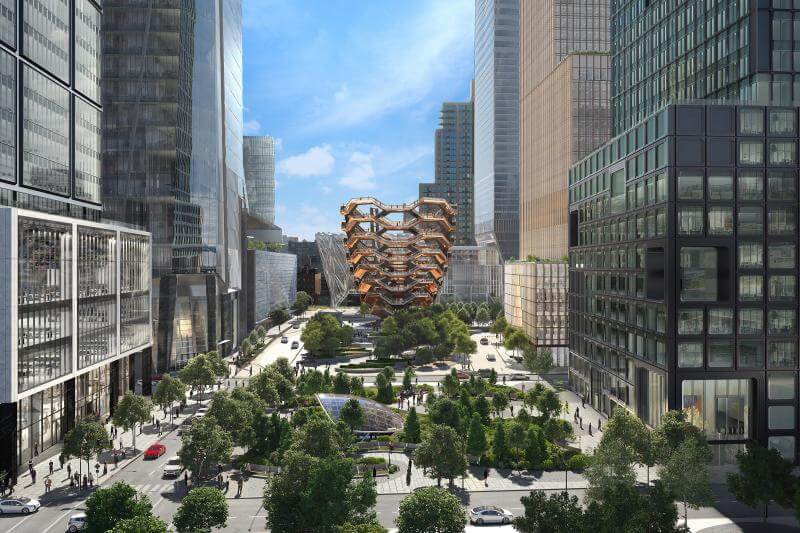
The Related Companies, a New York City real estate giant, along with Wynn Resorts is looking to build a casino from the ground up on an undeveloped area of Hudson Yards, which is located on the Far West Side of Manhattan.
The casino would be upscale and would be part of the newly created district that has been developed by the Related Companies that consists of office towers, high-end stores and luxury apartments.
The Midtown East proposal, which would also involve the construction of a new development, is led by real estate billionaire Stefan Soloviev and the Mohegan Tribe and calls for a huge Ferris wheel, a 1,200-room hotel, about 1,500 apartments as well as an underground casino—all to go up just south of the United Nations headquarters.
The overall project is being dubbed “Freedom Plaza,” according to Soloviev, and would also include the construction of a museum dedicated to the subject of democracy.
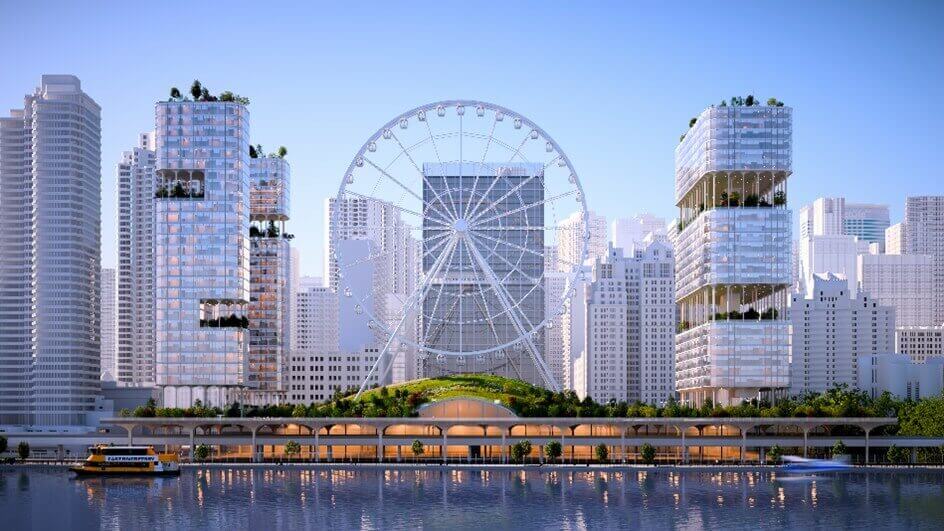
Outer boroughs in the running
There are several proposals for licenses that have come in from outside of Manhattan.
Steve Cohen, the billionaire owner of the New York Mets, has floated the possibility of building a casino as part of an entertainment complex on the 50-acre asphalt parking lot next to Citi Field.
The 50 acre is public parkland that has been used as a parking lot since the 1939 World’s Fair — as well as for events such as carnivals and a variety of other public uses. It also includes the former footprint of what was once Shea Stadium.
Cohen has held meetings, including two visioning sessions, with the public to solicit feedback as to what to incorporate in his plans.
“Having spent hours with the community at these sessions, one thing is abundantly clear: everyone believes we can do better than 50 acres of parking lots,” Cohen said.
A site in the Bronx is also in the running.
Bally’s, a large gaming company that operates in Atlantic City, is looking to develop a casino at Trump Golf Links in Throggs Neck.
The company said that it has struck a deal with the Trump Organization to take 17 acres of the 300-acre property that adorns the Trump name. The property is owned by the city, and Trump’s company has a 20-year contract with the Parks Department to operate it as a golf course.
Only 10 of the 17 acres Bally’s has negotiated with the Trump Organization would be designated for casino use, with the remaining land potentially used for employee housing.
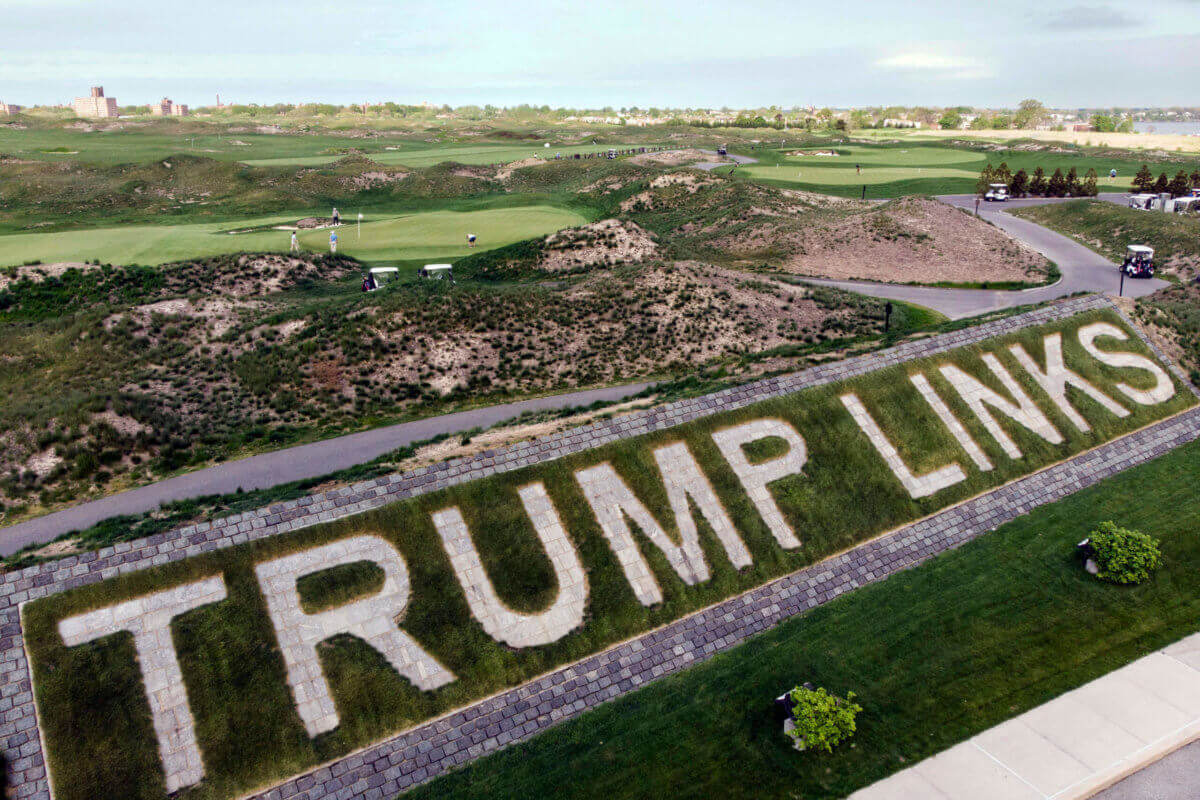
AP Photo/John Minchillo, File
Not to be outdone, a project in Brooklyn is in the running.
Thor Equities, a real estate investment firm, is partnering with Saratoga Casino Holdings and the Chickasaw Nation to build a casino in Coney Island.
The proposal seeks to revitalize the area by placing a casino by the famed Coney Island boardwalk near the Wonder Wheel.
Their proposal would feature a towering glass building overlooking the amusement park in the heart of the waterfront community. The structure, dubbed “The Coney”, would feature a new hotel just steps from the iconic boardwalk.
“The Coney will help revitalize Coney Island, bringing year-round jobs and world-class entertainment to Brooklyn and New York City,” said project spokesman Eric Koch. “The project’s revitalizing power will help drive a Coney Island comeback.”
Advocates say the casino would bring year-round foot traffic and transform Coney Island from a seasonal venue into a year-round entertainment area.
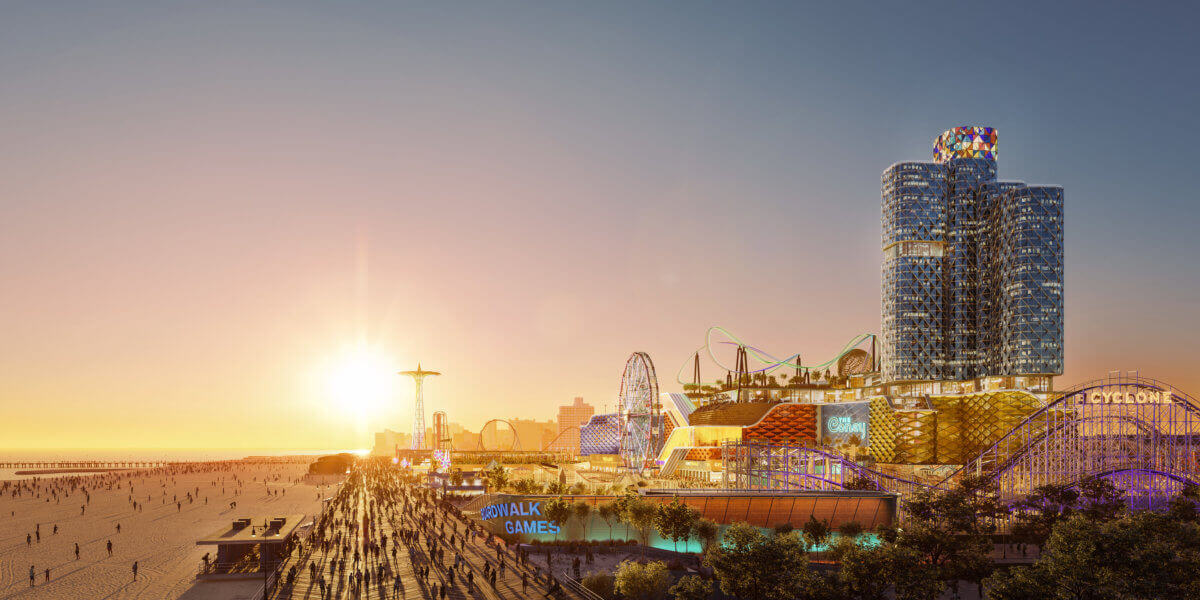
There is one proposal that includes a site on Long Island.
Las Vegas Sands has proposed turning the largely dormant Nassau Veterans Memorial Coliseum in Uniondale into a casino.
The company plans to lease the county-owned facility that has remained largely unused since the coronavirus pandemic. The property had previously hosted the New York Islanders hockey team.
The Sands proposal is billed as a multi-billion-dollar flagship hospitality, entertainment and casino project, which would include outdoor community spaces, four and five-star hotel rooms and a world-class live performance venue.
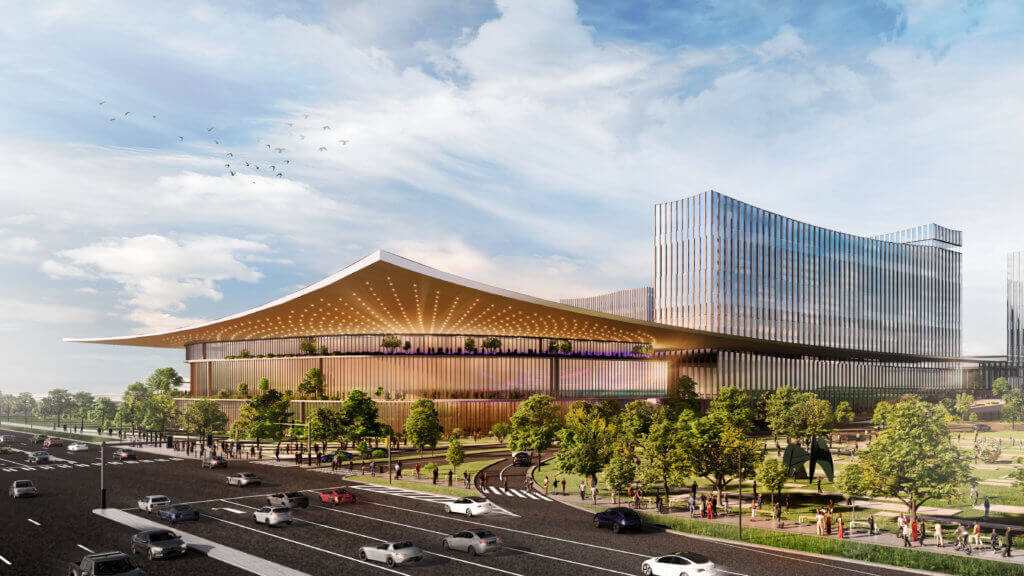
Pushback from local groups
Several of the proposals have already been subject to pushback since their announcement—and without community support the plans will go nowhere. The developers must get the approval of their respective Community Advisory Board as well as zoning and environmental approvals to be a contender.
The Times Square proposal has its critics.
The Broadway League, a trade association representing theater owners and producers, argues that the casino would hurt the bustling district.
The leaders of the organization wrote a letter to members in November outlining their opposition.
“The proposed plan to bring a casino to Times Square would introduce widespread economic and operational disruption, unprecedented congestion, and decreased safety and security,” the organization told its members.
Manhattan Community Board 5 has also issued a resolution opposing a casino site in Times Square.
However, supporters say that it would boost public safety and invigorate the area.
Meanwhile, the Saks Fifth Avenue proposal also has critics, with the local community board coming out against a casino in the area out of fears that it could hurt local businesses, according to published reports. The building is also located by Saint Patrick’s Cathedral, which is a center for tourists and local Catholics.
The Citi Field proposal has also drawn critics, with civic groups arguing that Cohen should not be permitted to build on public land.
“Queens must not lose 50 acres of its flagship park — a park built for and enjoyed by the residents of Queens — for the sole purpose of further increasing a billionaire’s personal profit margin at the expense and misery of the surrounding communities,” said Paul Graziano, a member of the Save Flushing Meadows Corona Park Coalition, who was at a rally in opposition to the project last week.
Cohen’s goal, however, to develop the area does have the support of business leaders who argue that it’s time to redevelop the parking lot. Cohen is also viewed favorably by elected officials such as Queens Borough President Donovan Richards, who describes him as “a good neighbor.”
The proposals in both Brooklyn and the Bronx have also generated mixed receptions. At a recent community meeting about the Coney Island proposal, many residents were skeptical of the idea although did say that they would be willing to accept it should the developers offer community benefits, such as revitalizing the boardwalk and funding schools.
The Bronx project has received the support of local officials, although there are residents who are opposed to it arguing that casinos hurt the poor, elderly and less educated.
No matter what proposal is approved, legislators such as Addabbo want the decision to come quickly, noting that the longer the state takes to award the licenses the longer it will be before the state benefits from the revenue. Furthermore, any delays postpone the boost to the local economy.
“The quicker the three licenses are approved, the quicker we can begin to realize the major benefits to the state, such as thousands of construction and post-construction jobs, billions in revenue from the licenses, an increase in problem gambling monies and programs, as well as billions more in educational funding when the winning casinos go live,” Addabbo said in a statement.
Read more: Rape reported in bar: Latest police blotter updates



